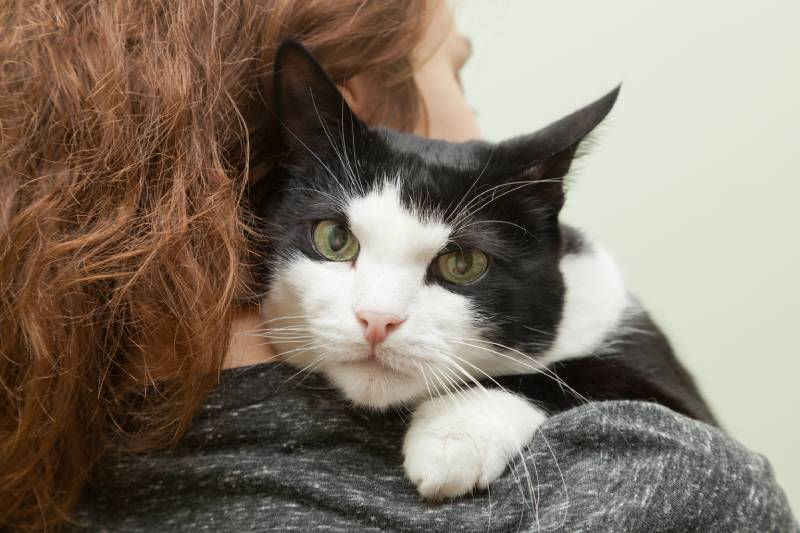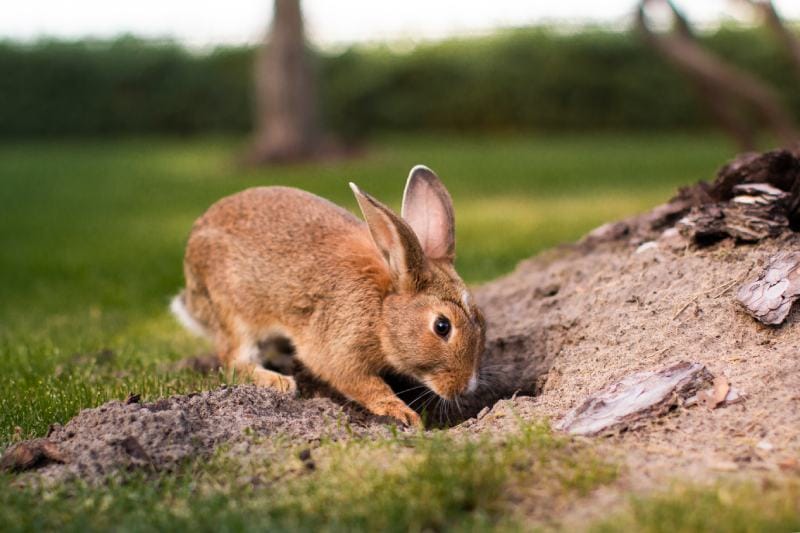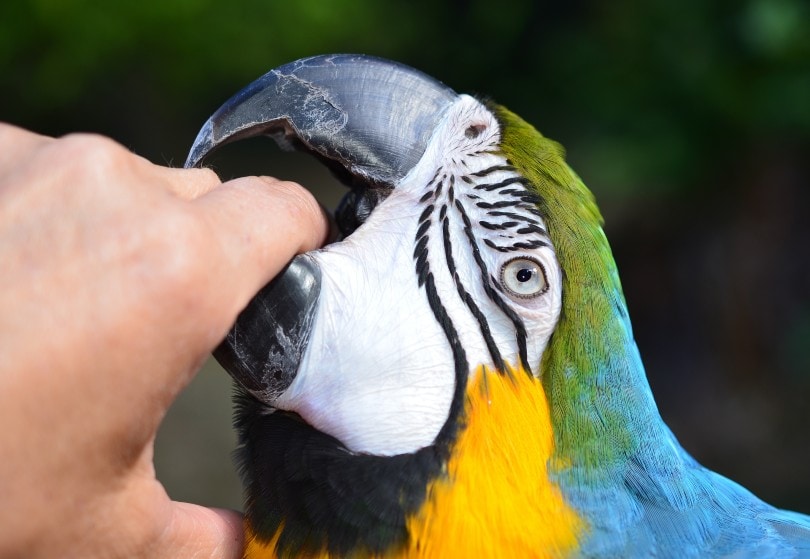VET APPROVED

The information is current and up-to-date in accordance with the latest veterinarian research.
Learn more »Click to Skip Ahead
Our feline companions experience and perceive the world fundamentally different from humans. But even though cats probably can’t understand precisely what we’re saying, they know when something is wrong with their human. They sense when we’re stressed, frightened, anxious, or depressed.
Research indicates that cats adapt to their owners’ personality traits. Neurotic and anxious pet parents tend to have overweight cats with behavioral issues and health problems.1 Several studies support the idea that cats are attuned to their owners’ emotions and behaviors.
If you’re afraid or scared of something, your cat will most likely respond in a similar way. Cats not only know when we’re stressed, but our stress can also impact our pets’ health and well-being.

Indicators of Feline Stress
When cats become stressed, their behavior changes; for example, you might see increasing vocalizations or excessive grooming. Other indications include toileting outside the litter box, scratching furniture, and appetite changes. Some otherwise mellow kitties become aggressive towards people and other pets.
Cats often withdraw and isolate themselves when depressed or anxious. Some may experience gastrointestinal issues such as diarrhea, and others may start sleeping more than usual.
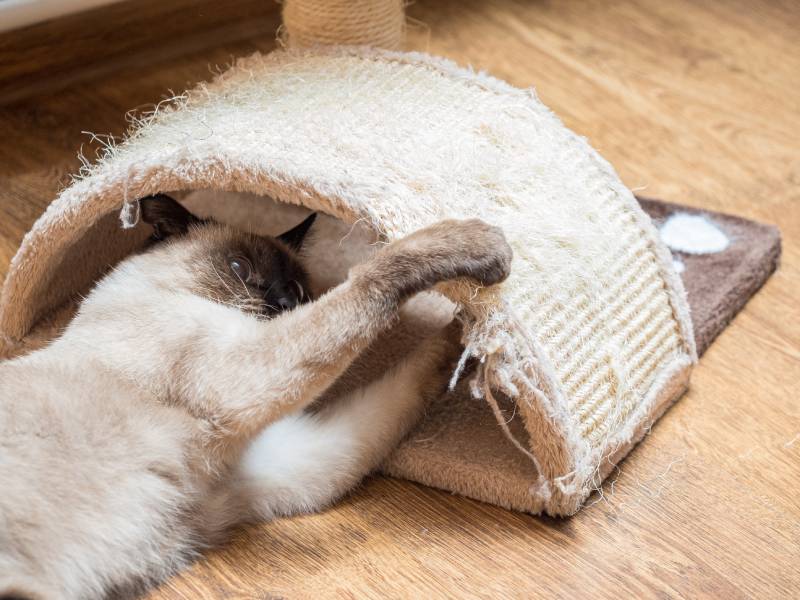

Preventing Feline Stress and Anxiety
Your anxiety might affect your cat, but cats can experience stress for other reasons.
New Food and Litter
Introducing new products gradually goes a long way when it comes to keeping your pet from becoming stressed out by food and litter changes. Most experts recommend gradually reducing the amount of one product and increasing the amount of the new food or litter over the course of 1 week or so.
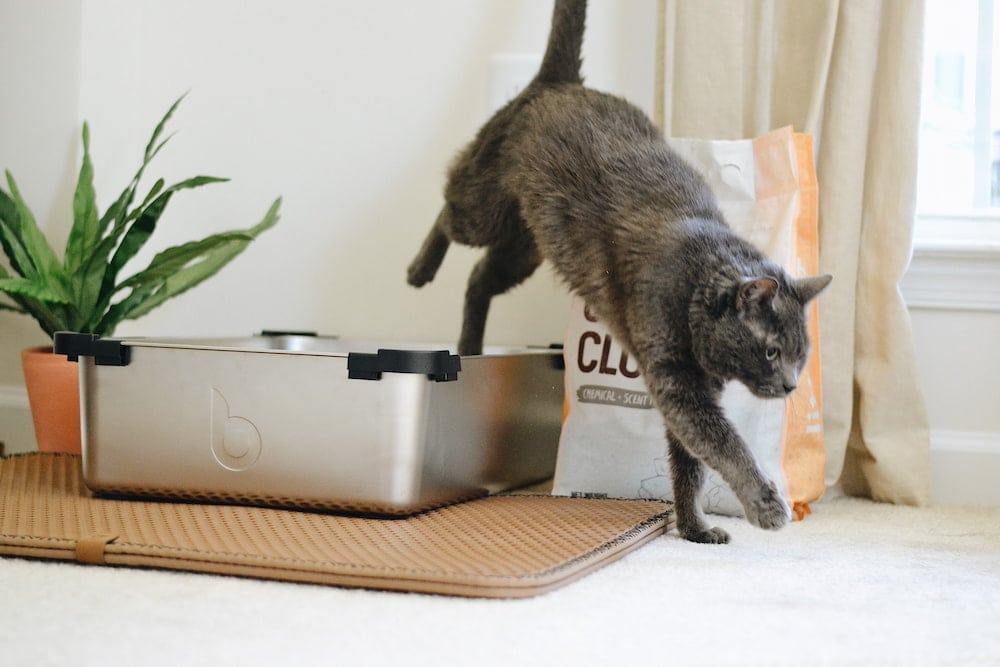
Moving to a New Home
Plan to keep outdoor pets inside for at least 1 month after you move to allow them plenty of time to adjust to their new home.
Consider taking a few of your cat’s toys and blankets to your new home ahead of time so your buddy will smell something familiar and comforting as soon as they arrive at their new space. Set up the litter box and a cozy corner for your pet to hang out well before your cat starts exploring their new digs to increase your pet’s sense of belonging.
Home Renovations
Prepare a safe place for your cat before home renovations begin. Make sure their spot is far away from where most of the noise will be coming from, and consider adding a nice high, comfortable perch so your cat can feel extra safe. Most cats feel most comfortable when nestled away up high.
It keeps them safe from predators and allows them to watch over their “territory.” If you’re bringing a new dog into your home, make sure your cat’s space is reliably dog-proof so your feline companion has a place to escape if things become too much.
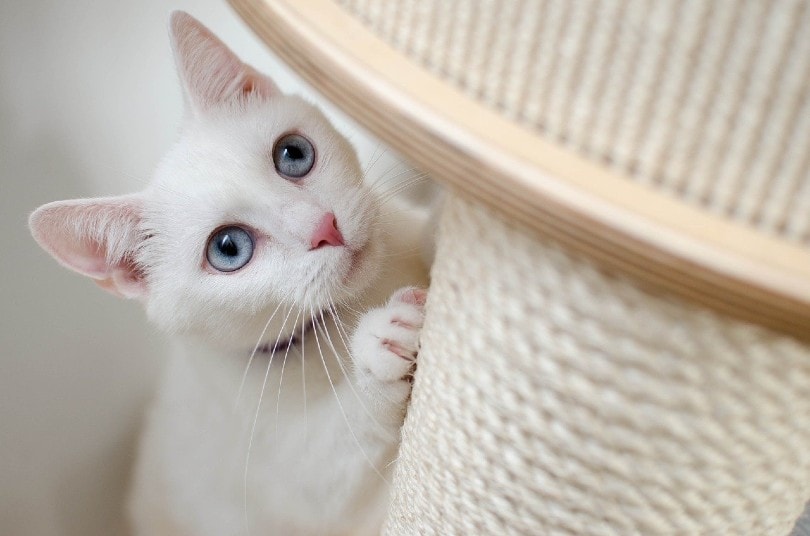
Reducing Feline Stress
Providing a stimulating environment is key to reducing stress and anxiety in cats. Environmental enrichment helps satisfy their natural instincts, keeping them physically and mentally engaged. Regular exercise is a great stress reliever, as it releases endorphins and helps prevent boredom-related behaviors. Aim for at least three short, 10-minute play sessions each day using interactive toys or wand toys to encourage movement and mental stimulation.
You can also purchase food puzzles and interactive games to keep your cat mentally engaged, which is great for their overall mental health. Catnip and valerian root can also provide olfactory enrichment. However, even aloof felines need attention from their owners, and it’s best to spend some time every day playing with your cat to keep them happy.
As another option, if you're looking to give your cat something exciting, we know of an awesome scratcher that both encourages play and doubles as a stylish modern furniture piece. The Hepper Hi-Lo Cat Scratcher is designed with a curved shape for dynamic movement, is built to last with safe and sturdy birch plywood and thick cardboard, and offers three height options to ensure your cat enjoys the exercise, elevation, and excitement they crave ... and, it's affordable!
At PangoVet, we've admired Hepper for many years, and decided to take a controlling ownership interest so that we could benefit from the outstanding designs of this cool cat company!
Specially formulated pheromone sprays can help give your pet a sense of calm, and quiet music may provide anxiety relief. Classical music and selections specifically developed for cats often reduce feline anxiety.
If you’re concerned about your cat’s behavior, take your pet to the veterinarian for a full examination to ensure that its stress is not a health concern. If your pet is diagnosed as suffering from stress, your veterinarian can provide guidance on supplements, including l-theanine, an amino acid that may reduce feline anxiety. If the condition doesn’t improve with conservative treatment, there are several prescription options your veterinarian may suggest.

Conclusion
Cats know when we’re stressed, depressed, scared, or anxious. Cats also mirror our emotions. Stressed-out and depressed owners often have cats that are overweight and struggle with chronic diseases and behavioral issues. There are several things you can do to help your pet manage their stress, including providing them with a cozy, safe place to hide out, ensuring they get sufficient exercise, and providing mentally stimulating toys to keep your buddy’s mind engaged.
- https://www.bluecross.org.uk/advice/cat/moving-house-and-travelling-with-cats
- https://petcube.com/blog/can-cats-sense-sadness-depression-and-anxiety/
- https://www.thesprucepets.com/introducing-cats-and-babies-553952
- https://pets.thenest.com/cats-feel-stress-owner-feels-stress-7956.html
- https://www.petmd.com/cat/wellness/evr_ct_exercising_with_your_cat_a_how_to_guide
- https://be.chewy.com/cats-pick-up-on-anxiety-study-says/
- https://www.petmd.com/cat/slideshows/10-helpful-ways-calm-your-cat
- https://www.cats.org.uk/help-and-advice/health/cat-stress
- https://www.petmd.com/blogs/thedailyvet/lhuston/2013/aug/how-to-transition-your-cat-to-new-food-30701
- https://www.healthline.com/health/l-theanine
- https://www.classicfm.com/music-news/cat-music-best-genre-relaxing/
- https://www.musicforcats.com/
- https://petcube.com/blog/can-cats-sense-sadness-depression-and-anxiety
Featured Image Credit: Olesya Kuznetsova, Shutterstock
